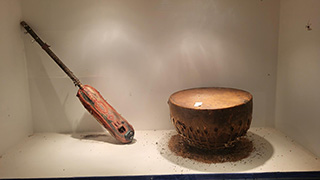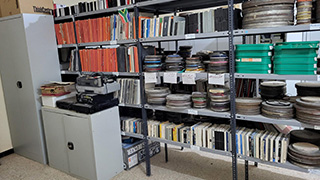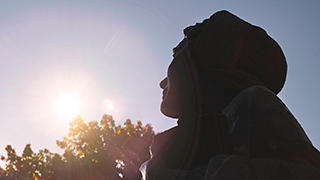Preserving Sahrawi History and Culture Through Library-Faculty Partnership
Tuesday, February 4, 2025
 The Sahrawi refugee camps near Tindouf, Algeria, hold archives with 50 years of diplomatic
and cultural history that few have seen. In November 2024, Sarah Ponichtera Ph.D., assistant dean of Special Collections & the Gallery, and Professor Joseph Huddleston of the School of International Relations and Diplomacy traveled to the Sahara Desert to survey these unique materials.
The Sahrawi refugee camps near Tindouf, Algeria, hold archives with 50 years of diplomatic
and cultural history that few have seen. In November 2024, Sarah Ponichtera Ph.D., assistant dean of Special Collections & the Gallery, and Professor Joseph Huddleston of the School of International Relations and Diplomacy traveled to the Sahara Desert to survey these unique materials.
Housed in Rabouni, the administrative center of Western Sahara’s government in exile, this archive is a rare and invaluable collection created by the Sahrawi people, documenting their history, colonization and ongoing struggle for liberation and independence. The people’s struggle for self-determination is an important one, and Ponichtera and Huddleston’s time in the field, seeing how people co-exist and care for each other in the refugee camps, was both enriching and enlightening in the context of the quest for autonomy by the Sahrawi people. “Diplomacy has played a central role throughout its history as an aspiring state fighting for self-determination," noted Huddleston. “The archives in question hold decades of unique data on the role of diplomacy in their self-determination struggle, during both the 16-year armed conflict from 1975-1991 and the subsequent ceasefire.”
Professor Huddleston initiated the project when he came to the library inquiring about support for digitization projects. The Sahrawi are a partially recognized state governed by the Polisario Front - the liberation movement for Western Sahara - since 1976, and out in the desert, the sprawling, remote location of the camps (and thus, the materials), lack of internet access, and limited infrastructure make research in the Sahrawi refugee camps extremely difficult. Because the Sahrawi government is not officially part of Algeria, it does not receive the same resources or services as the rest of the country.
Understanding the historical importance of these archives, which contain documents, photographs, films and personal correspondence, Huddleston sought to digitize them to make the information widely accessible. At Seton Hall, department faculty often collaborate with archivists, but it is typically an on-site or digital exchange, seldom requiring an extensive research trip. Working as a team in the field, Ponichtera shared her expertise in preservation and digitization, and Huddleston his deep knowledge of Sahrawi diplomacy. Together, they assessed the materials, surveyed the types and amounts of materials present, what formats the materials were in, and began to plan how digitization could be accomplished.

Some of the materials in the central archives, including audio visual recordings in a variety of formats.
This would not be easy, and even the initial assessment was challenging. Arriving in the settlement, Ponichtera and Huddleston realized the archives were much larger than they had anticipated—spread across five different repositories under five different ministries, each with varying levels of organization and preservation. Not all the materials they found were appropriate for public viewing, either: because of the active conflict in Western Sahara, some repositories contained sensitive information mixed with public records, requiring careful curation before digitization.
Helped by the advance efforts of an Austrian NGO, which built a state-of-the-art archival facility featuring secure storage, shelving, and climate control, Ponichtera and Huddleston learned that with this larger infrastructure in place, it was primarily storage materials for the collections themselves that were required – boxes, folders, and housing for individual items. Crucially, the dedication of the on-site Sahrawi archivists was unmistakable, with seven professionals maintaining the collections despite the many challenges to doing this kind of work with so few resources in an environmentally challenging location. They were determined to make the archives accessible and developed a classification system to enable preservation and access. The central archive evolved from the local radio and television station’s documentation of the Sahrawi struggle since the 1970s. These formats pose significant preservation issues, as the materials include a large variety of fragile outdated media formats like magnetic tape that need repair and digitization.
Now that Ponichtera and Huddleston have completed their survey, Sahrawi archivists have begun to create updated descriptions to enable future researcher access - after which digitization can commence on a subsequent trip. In the meantime, the Seton Hall team has returned stateside, buoyed by their experience with the dedicated, warm, and communal Sahrawi people.
The next steps are expected later this year when the Seton Hall team will work to develop a detailed plan for a second phase of digitization and rehousing the materials, ensuring their long-term preservation. Najla Mohamedlaminm, founding director of the Almasar Library Center in the Sahrawi camps (which educates women and children about climate change), is serving as Project Manager, overseeing metadata creation and preparing the archive for digitization.
“This project is about more than just preserving historical materials,” wrote Ponichtera and Huddleston. “It is about ensuring that the Sahrawi people can tell their own story. By safeguarding these records, researchers worldwide will gain insight into a nation’s struggle for self-determination, diplomacy, and resilience.”
Categories: Nation and World





